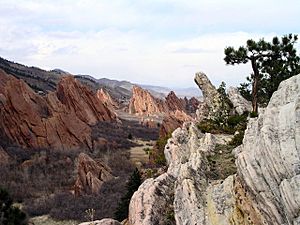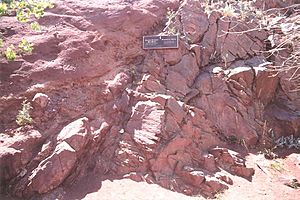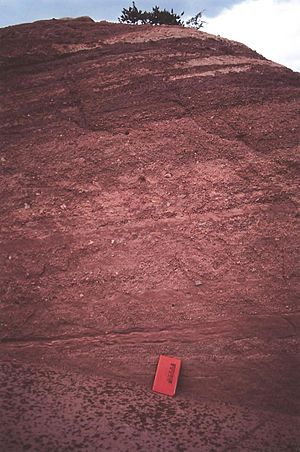Fountain Formation facts for kids
Quick facts for kids Fountain FormationStratigraphic range: Late Pennsylvanian |
|
|---|---|

Red rocks typical of The Fountain Formation seen at Roxborough State Park near Littleton, Colorado
|
|
| Type | sedimentary |
| Underlies | Lyons Formation |
| Overlies | Gleneyrie Formation |
| Thickness | 0–4,500 feet (0–1,372 m) |
| Lithology | |
| Primary | sandstone, conglomerate |
| Other | limestone, shale |
| Location | |
| Region | Denver Basin |
| Extent | Colorado, Wyoming |
| Type section | |
| Named for | Fountain Creek |
| Named by | C. W. Cross, 1894 |
The Fountain Formation is a type of rock found in Colorado and Wyoming, USA. It's mostly made of sandstone and conglomerate, which are rocks formed from sand and pebbles. These rocks are very old, dating back to the Pennsylvanian Period. You can see them along the eastern side of the Rocky Mountains and near the Denver Basin.
Contents
How the Fountain Formation Got Its Name
A geologist named W. C. Cross first described the Fountain Formation in 1894. He named it after Fountain Creek in El Paso County, Colorado, where these rocks are clearly visible.
How These Red Rocks Formed
The Fountain Formation rests on top of much older rocks, like Precambrian granite. These older rocks are billions of years old! The Fountain rocks usually tilt steeply towards the east.
These rocks were formed from the erosion of ancient mountains, sometimes called the Ancestral Rocky Mountains. Imagine huge rivers carrying sand, pebbles, and mud down from these mountains. This material then spread out in large, fan-shaped deposits called alluvial fans.
The Fountain Formation gets its famous red color and its rock types from the granite and gneiss that it eroded from. It's like the mountains "donated" their pieces to make these new rocks.
Where to See the Fountain Formation
You can see amazing examples of the Fountain Formation at many famous places in Colorado:
- The Flatirons, near Boulder, Colorado
- Red Rocks Park and Amphitheater, in Golden, Colorado
- Roxborough State Park, south of Denver, Colorado
- Garden of the Gods in Colorado Springs, Colorado
- Red Rock Canyon Open Space in Colorado Springs, Colorado
Ancient Life in the Fountain Formation
Scientists have found fossils in some parts of the Fountain Formation. In Perry Park, they found fossils of sea creatures like bryozoans, brachiopods, crinoids, echinoids (like sea urchins), and gastropods (like snails). This tells us that some areas were once covered by ancient seas.
Plant fossils have also been found in Garden Park, near Cañon City. These include ancient trees and plants like Lepidophloios laricinus, Sigillaria, Calamites, and Neuropterus sp. These fossils help us understand what the land looked like millions of years ago.
How Old Are These Rocks?
The rocks of the Fountain Formation are from the Late Pennsylvanian Period. This means they are between 290 and 340 million years old! That's a very long time ago, even before dinosaurs roamed the Earth.
 | Janet Taylor Pickett |
 | Synthia Saint James |
 | Howardena Pindell |
 | Faith Ringgold |



